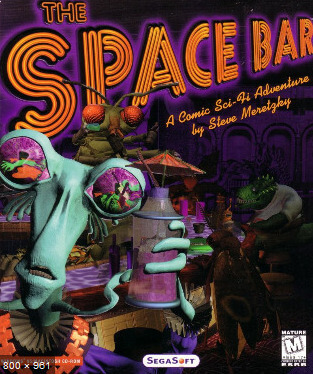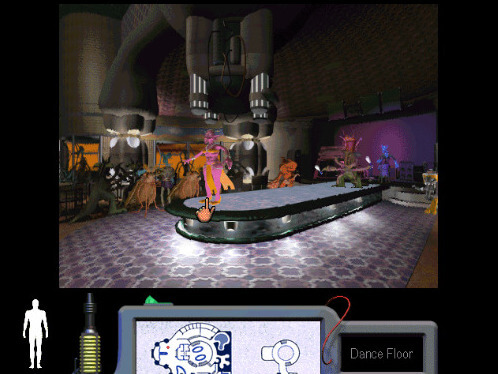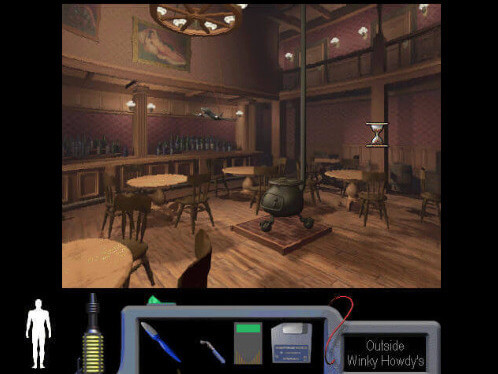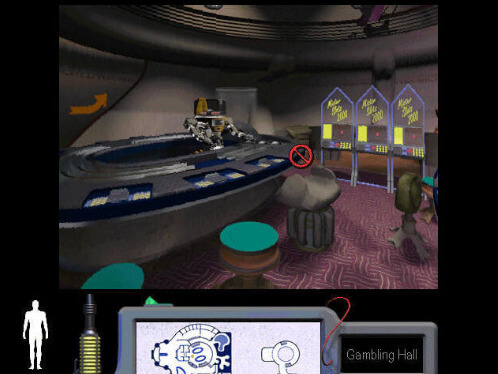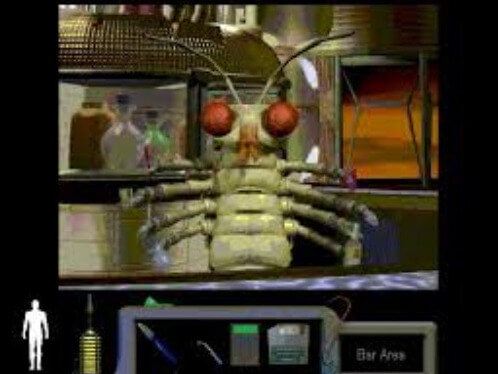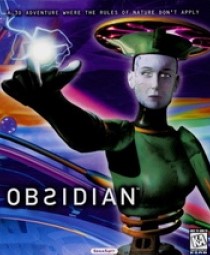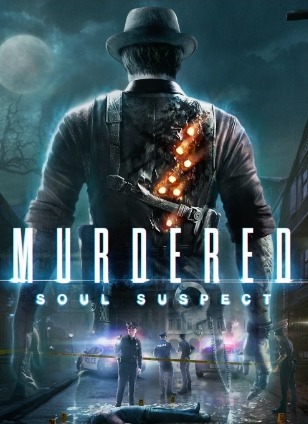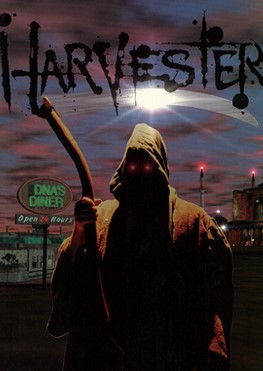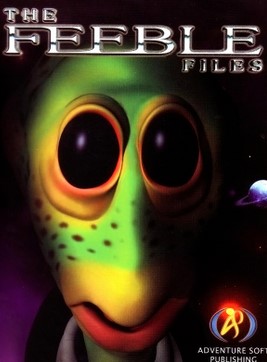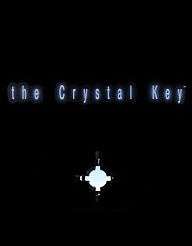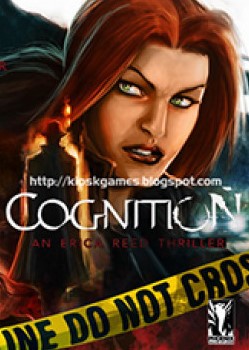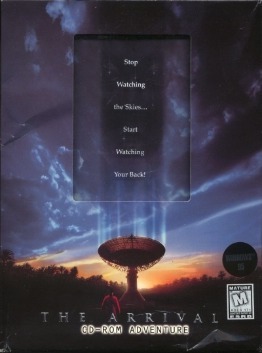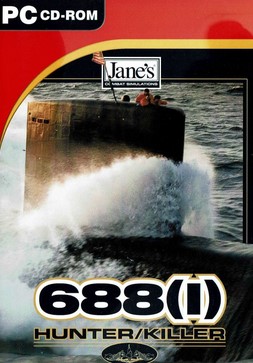The Space Bar is a graphic adventure game that takes place from a first-person camera perspective. The player points and clicks with a mouse cursor to navigate the game world, examine and manipulate the environment, look around and converse with non-player characters. In a manner that has been compared to Myst and Zork Nemesis, player movement is restricted to jumps between panoramic static screens; the camera view can rotate 360° on each screen. A pop-up menu is used to interact with characters and the environment: the menu's options change depending on the object selected, and can include actions such as "greet" or "take". At the bottom of the game screen, the PDA interface contains an item inventory, a mini-map, a journal and other features.
The Space Bar is a work of comic science fiction and detective fiction, set on the planet Armpit VI and inside a fantastical alien bar called The Thirsty Tentacle. The story begins with the murder of a private investigator near The Thirsty Tentacle, in an act of industrial espionage. Human detective Alias Node and his partner Maksh witness the murder, committed by a shapeshifting assassin; and Maksh is kidnapped by the perpetrator, who hides inside the bar. Assuming the role of Alias, the player interrogates roughly 40 aliens within The Thirsty Tentacle to locate the killer. Gameplay is nonlinear: the player may progress through The Space Bar and search for clues in any order. However, there is a time limit, and the player receives a game over for failing to arrest the assassin before they escape. It is also possible for the player character to be killed.
The core gameplay of The Space Bar occurs through Alias Node's Empathy Telepathy power. Activated when the protagonist establishes an emotional connection with another character, it inserts the player into the target's mind to live out its memories. Eight of these vignettes are included, with estimated lengths of 5-10 hours per segment. The Space Bar's structure and puzzles change to suit each alien. For example, the blind Auditon creature must navigate by sound; objects in the game world are invisible until they make noise. Seedrot of the Vedj race is an immobile plant, and must solve puzzles from a single location, while "714-Z-367" of the Zzazzl race views the world through compound eyes. In the end, the player rescues Maksh and identifies the killer, Ni'Dopal, via an Empathy Telepathy excursion into the shapeshifter's memories.
Reception and aftermath
The Space Bar was a commercial flop. The editors of Computer Gaming World noted that it was "one of the year's best adventures, but, unfortunately, it never seemed to find an audience (call it the curse of Rocket Science)." Steve Meretzky later summarized that it "sold like bat guano", and described its commercial performance as possibly the biggest disappointment of his career. Noting that "the mentality of gamers had definitely changed" since the 1980s, Meretzky also expressed regret over his decision to make The Space Bar extremely difficult. He characterized this move as the most major design mistake of his career by 2000. However, both Mike Dornbrook and Meretzky were pleased with the game's critical reception. In 2011, Adventure Gamers named The Space Bar the 98th-best adventure game of all time.
PC Gamer US writer Allen Rausch hailed The Space Bar as a return to form for its genre, which combined the high points of interactive fiction with the strengths of modern graphic adventures. Its puzzle design, humor and level of interactivity received plaudits, although Rausch found fault with its disk swapping and some of its voice acting. Conversely, Scorpia of Computer Gaming World wrote that The Space Bar "just misses the mark" and is recommendable mostly to players "with a high tolerance for frustration." While Rausch and Scorpia agreed on the game's high difficulty and reliance on trial and error gameplay, she considered both the result of poor puzzle design. She also criticized the time limit and lack of traditional detective gameplay, and called The Space Bar's comedy strained and inferior to that of Superhero League of Hoboken, despite "some genuinely humorous touches".
CNET Gamecenter's Barry Brenesal enjoyed the game's visuals, humor, puzzles and Empathy Telepathy sequences, but noted that The Space Bar "is not the end all of adventure games." He agreed with Rausch's and Scorpia's assessments of the puzzles: the game features "arguably ... a greater density of sheer fiendishness than anything else on the market". In Computer Games Strategy Plus, Cindy Yans similarly praised the game as "a puzzle parfait from heaven", with an unusually extensive amount of content. Despite sharing Brenesal's admiration for the visuals, she broke with him on the quality of its animation, particularly the lack of lip sync, and agreed with Rausch on the spotty voice-over. As with Brenesal, Rausch and Scorpia, she noted the game's high level of difficulty: "Meretzky has constructed the most devious set of puzzles you're likely to encounter anywhere (with few exceptions)", Yans wrote. As a result, she echoed the latter two reviewers in recommending The Space Bar primarily to experienced adventure game players.
